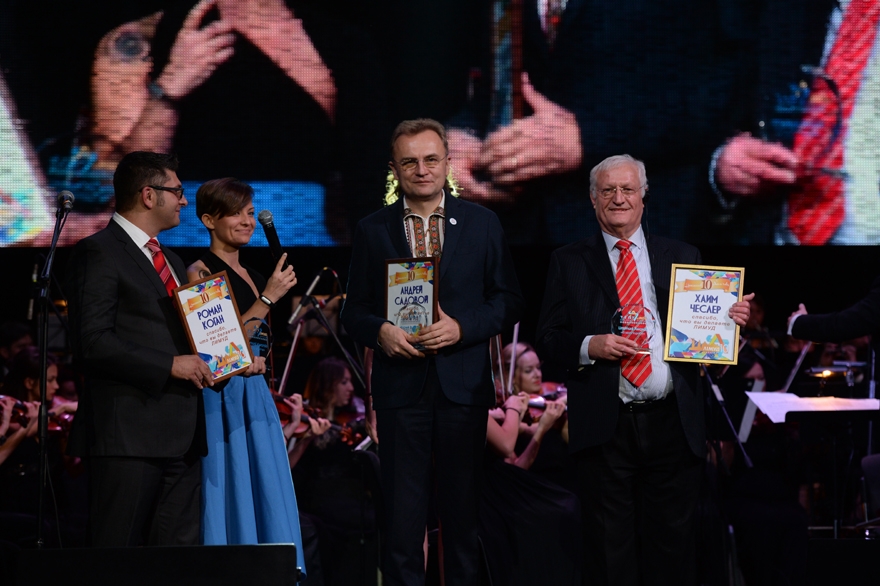Nearly 1,000 Jews gather in Ukrainian city that honors alleged Holocaust perpetrators
Published November 7, 2016

Limmud FSU founder Chaim Chesler, right. Lviv Mayor Andriy Sadovyi and Roman Kogan attending an event at the Lviv opera house on Nov. 6, 2016. (Photo: Boris Bukhman)
LVIV, Ukraine (JTA) — Nearly 1,000 people attended the largest Jewish gathering held in decades in the western Ukrainian city of Lviv, which has numerous monuments honoring Holocaust-era alleged war criminals.
ADVERTISEMENT
The mostly Jewish crowd of 900 people on Saturday night filled the Lviv Theater of Opera and Ballet for a concert and ceremony celebrating a decade of activity by the Ukraine branch of Limmud FSU – a network of organizations responsible for holding Jewish learning conferences across the former Soviet Union and other countries with Jewish Russian speakers.
Many of the participants of the four-day event in Lviv belonged to the city’s Jewish population of 1,200 but most came here from across Ukraine for the 10th anniversary event, which also was attended by Lviv Mayor Andriy Sadovyi.
Lviv, whose pre-Holocaust Jewish population of 150,000 was virtually wiped out by the Nazis and their local collaborators, is widely seen as the cradle of the country’s nationalist revival.
In 2007, the city erected a statue for Stepan Bandera, a nationalist leader whose followers are believed to have killed thousands of Jews in the 1940s, when they briefly collaborated with Nazi Germany as members of the UPA militia.
ADVERTISEMENT
Lviv also has a Bandera Street and since 2001, a museum commemorating Roman Shukhevych, another nationalist implicated in war crimes against Jewish Ukrainians.
The spreading of official commemoration of such figures to the country’s capital Kiev and other cities has reignited the debate about them in Ukraine, which saw an explosion of nationalist sentiment following a revolution that in 2013 ended with the ousting of former president Viktor Yanukovych, who critics said was a corrupt Kremlin stooge.
Earlier this year, more than 20 Ukrainian Jewish groups condemned the veneration of personalities connected to the murder of Jews.
The Limmud Conference featured several lectures on the subject, including one by historian Oleksandr Denysenko about UPA members who saved Jews. While conceding that UPA members carried out atrocities, he noted that: “Under communism, the UPA was demonized and these rescue stories were suppressed.”
In modern Ukraine, however, attempts to whitewash the UPA, including by state historians, mean that “a political narrative is once again at risk of interfering with the historical record,” he said.
The conference’s main theme, however, was neither the UPA nor the Holocaust but the centrality of the Lviv area in the establishment of Zionist youth movements in the 19th and 20th centuries.
“Lviv has a grand Jewish history, which is also tragic and complicated,” said Chaim Chesler, founder of Limmud FSU. “There are phenomena here which many Jews find unfortunate but the arrival here of so many Jews, and their warm reception by city authorities, send out a strong message: We are here, and our voice is heard loud and clear.”















